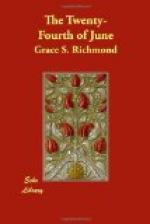“That’s what I don’t know,” said the girl. “When he writes like this—the last two pages I can’t read to you—I don’t know what I think. And I’m not used to not knowing what I think! It’s disconcerting. It’s like being taken off your feet and—not set down again. Yet, when I’m with him—I’m not at all sure I should ever want him nearer than—well, than three feet away. And he’s so insistent—persistent. He wants an answer—now, by mail.”
“Are you ready to give it?”
“No. I’m afraid to give it—at long distance.”
“Then do not. You are under no obligation to do that. The test of actual presence is the only one to apply. Let him wait till he comes home. It will not hurt him.”
She spoke with spirit, and her daughter responded to the tone.
“I know that’s the best advice,” Roberta said, getting to her feet. “Mother, you like him?”
“Yes, I have always liked Forbes,” said Mrs. Gray, with cordiality. “Your father likes him, and trusts him, as a man of honour, in his profession. That is much to say. Whether he is a man who would make you happy—that is a different question. No one can answer that but yourself.”
“I haven’t wanted any one to make me happy.” Roberta stood upon the hearth-rug, a figure of charm among the lights and shadows. “I’ve been absorbed in my work—and my play. I enjoy my men friends—and am glad when they go away and leave me. Life is so full—and rich—just of itself. There are so many wonderful people, of all sorts. The world is so interesting—and home is so dear!” She lifted her arms, her head up. “Mother, let’s play the Bach Air,” she said. “That always takes the fever out of me, and makes me feel calm and rational. Is it very late?—are you too tired? Nobody will be disturbed at this distance.”
“I should love to play it,” said Mrs. Gray, and together the two went down the room to the great piano which stood there in the darkness. Roberta switched on one hooded light, produced the music for her mother, and tuned her ’cello, sitting at one side away from the light, with no notes before her. Presently the slow, deep, and majestic notes of the “Air for the G String” were vibrating through the quiet room, the ’cello player drawing her bow across and across the one string with affection for each rich note in her very touch. The other string tones followed her with exquisite sympathy, for Mrs. Gray was a musician from whom three of her four children had inherited an intense love for harmonic values.
But a few bars had sounded when a tall figure came noiselessly into the room, and Mr. Robert Gray dropped into the seat before the fire which his wife had lately occupied. With head thrown back he listened, and when silence fell at the close of the performance, his deep voice was the first to break it.
“To me,” he said, “that is the slow flowing and receding of waves upon a smooth and rocky shore. The sky is gray, but the atmosphere is warm and friendly. It is all very restful, after a day of perturbation.”




